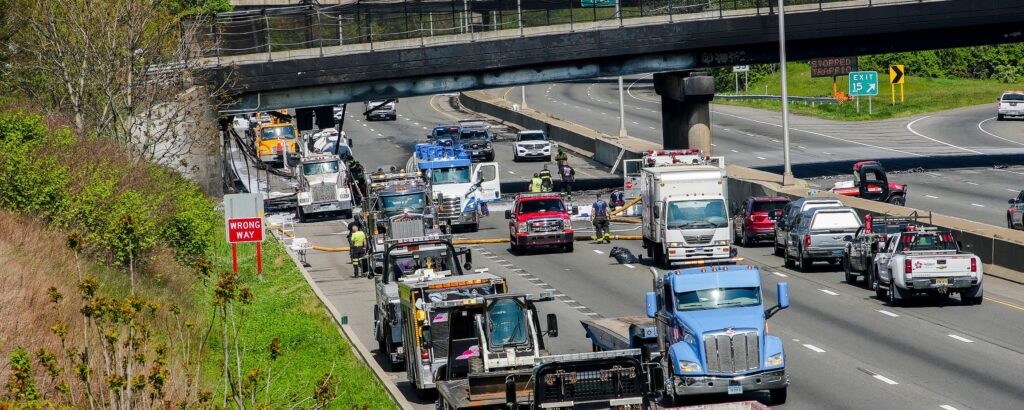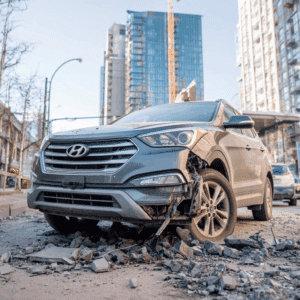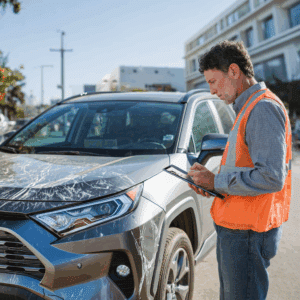Flying Debris Hit My Car: What to Do Next
Last updated Monday, October 13th, 2025

Flying debris hit my car – now what? Learn who’s liable for road debris damage, how to file claims, what to tell insurance, and when to seek compensation in this comprehensive guide.
You’re cruising down the highway, music playing, when suddenly—crack! A chunk of debris slams into your windshield or dents your hood. Your heart races as you safely pull over, staring at the damage. If flying debris hit my car, you’re probably wondering who’s responsible and what steps you should take next.
Road debris accidents are more common than most drivers realize, and they can leave you facing significant repair bills, insurance headaches, and legal questions. The good news? You have options, and understanding your rights can make all the difference in getting the compensation you deserve.
Let’s break down everything you need to know about liability, insurance claims, and protecting yourself when road debris strikes your vehicle.

Get Your FREE Case Review,
In Person or Virtually Online
Understanding Road Debris Accidents
Road debris encompasses anything that shouldn’t be on the roadway—fallen cargo from trucks, construction materials, tire fragments, tree branches, rocks, and even furniture. When these objects become airborne or sit in your path, they pose serious dangers to vehicles and drivers.
The circumstances surrounding how debris hits your car significantly impact who bears responsibility. Did it fall directly from another vehicle? Was it kicked up from the road? Did a commercial truck fail to secure its load properly? These details matter when determining liability and pursuing compensation.
Who Is Liable When Flying Debris Hits Your Car?
Liability for road debris damage depends on several factors, and pinpointing the responsible party can be surprisingly complex.
The Vehicle That Caused the Debris
If debris falls directly from another vehicle—like lumber from an unsecured truck bed or cargo from a commercial trailer—the driver or owner of that vehicle is typically liable. They have a legal duty to properly secure their loads, and failure to do so constitutes negligence. In these cases, you may have grounds to pursue a claim against that driver’s insurance.
Government Entities
Sometimes, government agencies responsible for road maintenance may bear liability if debris results from their negligence. This could include fallen traffic signs, inadequate debris removal after storms, or construction materials left on roadways. However, suing government entities involves special procedures and shorter filing deadlines, so quick action is essential.
Commercial Trucking Companies
When commercial vehicles are involved, liability may extend beyond the driver to the trucking company itself. Companies must ensure proper cargo securing, vehicle maintenance, and driver training. If any of these elements failed, the company shares responsibility for resulting damages.
The Complexity of “Kicked Up” Debris
Here’s where things get tricky: if a vehicle ahead of you kicks up debris already on the road, liability becomes murkier. Most states don’t hold drivers responsible for debris that was already present on the roadway, even if their tires launched it toward your car. This legal gray area often pushes claims toward your own insurance coverage rather than another driver’s liability.
What Happens If Debris Hits Your Car?

First, safety comes first. If possible, safely pull over and assess the damage. Turn on your hazard lights and move to a secure location away from traffic. Check for injuries to yourself and any passengers before worrying about vehicle damage.
Next, document everything. Take photos of the damage from multiple angles, photograph any debris if it’s safe to do so, and capture the surrounding area.
If you saw which vehicle the debris came from, note its description, license plate, and direction of travel. These details become crucial evidence later.
Contact the police to file an accident report, especially if you witnessed where the debris originated or if the damage is substantial.
An official police report strengthens your insurance claim and any potential legal action. Even if the responsible party drove away, having the incident on record matters.
Collect witness information if anyone stopped or saw the incident. Independent witnesses can corroborate your account and help establish fault. Get their names, phone numbers, and brief statements about what they observed.

Get Your FREE Case Review,
In Person or Virtually Online
What Should You Not Say When Making an Insurance Claim?
Your words matter tremendously when dealing with insurance companies. Certain statements can weaken your claim or provide adjusters with ammunition to deny or minimize your payout.
Never admit fault or apologize, even casually. Phrases like “I’m sorry” or “I should have seen it” can be interpreted as accepting liability. Stick to factual descriptions of what happened without inserting judgment or speculation about blame.
Avoid exaggerating or embellishing details. Stick to the truth and what you actually observed. Inconsistencies between your statements and evidence can raise red flags and jeopardize your entire claim.
Don’t provide recorded statements without consulting an attorney first. Insurance adjusters may seem friendly, but they’re trained to elicit information that benefits their company. You’re required to cooperate with your own insurer, but anything you say to another party’s insurance can be used against you.
Never downplay your injuries or damage. Saying “I’m fine” immediately after an accident might seem polite, but some injuries manifest hours or days later. Similarly, preliminary damage assessments often miss hidden problems. Wait for professional medical and mechanical evaluations before characterizing the extent of harm.
Don’t accept the first settlement offer without consideration. Initial offers are frequently lowballing actual costs. Get complete repair estimates and medical assessments before agreeing to any settlement that closes your claim.
Is Roadkill Damage Covered by Insurance?
This surprisingly common question has a straightforward answer: yes, typically, roadkill damage falls under comprehensive coverage, not collision coverage.
Comprehensive insurance covers damage from events outside your control, including animal collisions. Whether you hit a deer, a stray dog, or, unfortunately, strike roadkill already on the road, comprehensive coverage should handle the repairs minus your deductible.
However, there’s an important distinction. If you swerve to avoid roadkill and hit another vehicle, guardrail, or fixed object, that scenario falls under collision coverage instead. The same applies if another driver swerves for roadkill and causes an accident—collision coverage or liability insurance would respond.
Check your policy details, as comprehensive coverage is optional in most states. If you carry only liability insurance or liability plus collision, roadkill damage won’t be covered unless another driver’s negligence caused the situation.
When Should You Not File an Insurance Claim?
Not every incident warrants filing an insurance claim. Sometimes paying out of pocket actually saves money and hassle in the long run.
Consider skipping the claim if repair costs barely exceed your deductible. If you’re facing $600 in repairs with a $500 deductible, filing a claim nets you only $100, but it could increase your premiums for years. The premium increase often costs more than the minor damage.
Similarly, avoid claiming very minor damage you can handle yourself. Small scratches, tiny chips, or purely cosmetic issues might not justify the paperwork and potential rate consequences.
Be strategic about claim frequency. Multiple claims within a short period—even if not your fault—can flag you as high-risk to insurers. This can result in non-renewal or dramatically higher rates. If you’ve recently filed claims, consider whether this debris damage justifies another mark on your record.
However, never avoid filing when injuries are involved, when damage is significant, or when another party is clearly at fault. In these cases, proper documentation through insurance claims protects your rights and ensures access to necessary resources for recovery.

Get Your FREE Case Review,
In Person or Virtually Online
Steps to Take After Flying Debris Damages Your Vehicle

Report the incident to your insurance company promptly. Most policies require timely notification, and delays can complicate or jeopardize coverage. Provide the facts without speculation, and give them your documentation.
Obtain repair estimates from reputable shops. Many insurance companies have preferred providers, but you typically have the right to choose your repair facility. Get multiple estimates to ensure fair pricing.
Keep all receipts and records related to the incident. This includes towing costs, rental car expenses, repair bills, medical visits, and even time missed from work. These documents substantiate your damages and support your claim.
Consider consulting a personal injury attorney if injuries occurred, if fault is disputed, or if the insurance company is being difficult. Many attorneys offer free consultations and work on contingency, meaning they only get paid if you receive compensation.
Protecting Yourself on the Road
While you can’t prevent all debris encounters, defensive driving reduces your risk.
Maintain safe following distances, especially behind trucks and vehicles carrying loads. The recommended three-second gap gives you more reaction time if something falls or gets kicked up.
Stay alert to road conditions and potential hazards ahead. Scanning far down the road helps you spot debris early and safely maneuver around it when possible.
Avoid driving directly behind large trucks or vehicles with unsecured cargo. Position yourself where you can see around them, or maintain extra distance.
Keep your insurance coverage adequate. Comprehensive coverage costs relatively little but provides significant peace of mind for debris strikes, animal collisions, and other non-collision damage.
Related Article(s)
What to Do If Protesters Attack Your Car: A Complete Safety Guide

